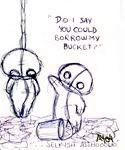I just got a bug for Greek-Roman ancient movies. Anyway, a number of movies, Alexander being one of them. They show young boys wrestling. Wrestling seemed to be a part of military ancient world.
However in reality there is no real combat application to war tackticks. Most soldiers weilded a sword, some carried spears and sheild.
By no means I am putting down wrestling. What I am wondering is why did they teach it.
It's almost like teaching wristlocks to modern soldiers who 99% of the time, will never see an armed enemy within a grappling or stricking distance.
However in reality there is no real combat application to war tackticks. Most soldiers weilded a sword, some carried spears and sheild.
By no means I am putting down wrestling. What I am wondering is why did they teach it.
It's almost like teaching wristlocks to modern soldiers who 99% of the time, will never see an armed enemy within a grappling or stricking distance.


 .
.
Comment